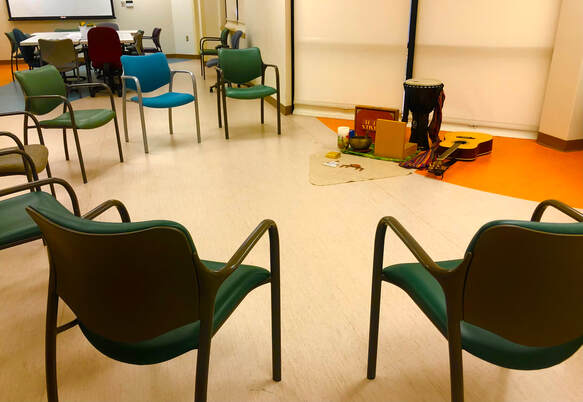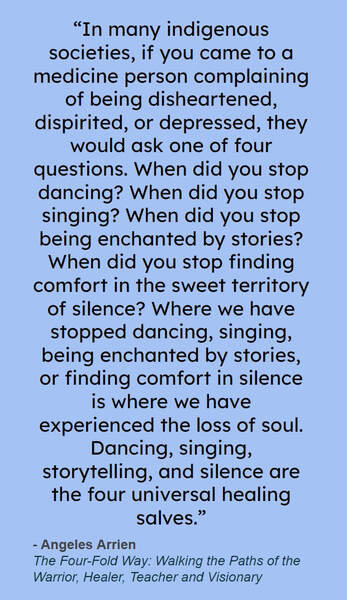Wisdom Stories Through Godly/Spirit Play: Facilitating Spiritual Care Groups

A Holistic Approach: Employing Diverse Modalities to Support Participation and Increase Inclusivity
While my work in spiritual care (as a chaplain) is with mental health patients in Behavioral Health, my approach and the accompanying curriculum in facilitating spiritual care groups is applicable in diverse contexts: senior care facilities, congregations, education/school, camps, and spiritual retreats. My particular methodology has been influenced by my experiences leading and facilitating groups in diverse contexts over many years: with kids/youth, adults with dementia, coaching in athletics, and teaching students in academic settings. In my spiritual care groups, I strive for inclusivity: a holistic approach of mind, body, spirit. My goal is to invite and empower participation from patients with diverse learning styles, personality types, energy levels, ages, backgrounds, diagnosis and levels of functionality by diversifying modalities of participation in my groups. Hence, in addition to making space for cognitive reflection through verbal sharing and reflection, I also include singing, musical instruments, readings, journaling, visual art, sculpture, body movement, meditative gestures, guided meditation, breathing and silence. This diversity of modalities allows participants to choose to participate in activities that match their ability, affinity, and comfort level. A key component of a holistic approach is my belief in the power of symbols, metaphor and rituals in multivalent meaning-making, allowing the participant to tap into the affective dimension of the human healing journey. See this bibliography link on the importance of integrating spiritual care in mental health services. |

4-Part Structure of the Session
I arrange the space in a circle, and set up a small sacred altar (cloth, candle and a bell) at the center. The flow of the 1 hour session usually has the sequence outlined below. For a fuller explanation of how I shape the spiritual care sessions and the curriculum, feel free to view my learning modules.
A. OPENING
B. WISDOM STORY
C. THE WORK
D. CLOSING
I arrange the space in a circle, and set up a small sacred altar (cloth, candle and a bell) at the center. The flow of the 1 hour session usually has the sequence outlined below. For a fuller explanation of how I shape the spiritual care sessions and the curriculum, feel free to view my learning modules.
A. OPENING
- Briefly explain what the group is all about and share the role of a chaplain, and the purpose of the session (including a working definition of spirituality). Explain the activities in the session which may include the following: to listen to each other's stories by reflecting on a story/parable/mythology, to do contemplative art work, to read/sing poems & prayers, to practice mindful breathing, prayerful gestures & silence. Guidelines: Respect (no cross talk); Use a talking object. Lighting the candle to mark the sacred circle. On the topic of ritual & space, check this podcast with Lisa Schirch. When introducing the session, here is a script you can adapt for your context.
- Welcome Song
- Invite everyone to share their name, their pronouns, and share a bit about themselves using one of these check-in tools: (a) Rock & Water - aka highs & lows, (b) Holy Listening Stones, (c) Spiritual Assessment, (d) Personality Assessment, (e) Avatar the Last Airbender, + Elements Circle (f) The 4 Seasons - aka Quadratos, (g) 12 Basic Tools
- Breathing Exercise + Quadratos Prayer Gestures + Ring the bell for silence
- Peace Song to get ready (OR play a peaceful instrument, like a flute, ring bell 3x for thirty second silence, then ring chime)
B. WISDOM STORY
- Hearing a Wisdom Story (click on Leader's Guide tab for a list of wisdom stories that I use in my spiritual care groups)
- Sharing our wonderings & reflections. Levels of Meaning Making: In terms of finding meaning, it is important to have full flexibility on how participants draw out meaning from the wisdom story. (1) It is worth noting that sometimes participants may not find any meaning at all, and that's OK (in Godly Play we say, "Sometimes a wisdom story is hard to open, and that is OK because you could always come back to it at a later time until that story opens up to you"). (2) If participants are unable to articulate some meaning in a story, they may simply name an image, word, or phrase (or archetypal theme/metaphor) that resonates with them; this is akin to an informal Lectio Divina (3) If participants articulate theological connections, the intent of the group is to allow a plurality of interpretations. Nuance, multiple meanings, multivalence, and multidimensionality are central exegetical values in spiritual care support groups. To get a sense of how to facilitators lead "Wondering Questions" in Godly Play, go to the Godly Play youtube channel to see teachers model the methodology of wondering reflections.
- Ring the bell once for brief silence
- A reading and/or song related to the story's theme
C. THE WORK
- The Work - Clay sculpture, Coloring page, and/or Reflection Sheet (10 minutes)
- Spiritual Care Plan: This handy worksheet helps participants to narrow down actions that they can commit to that will help them in their journey towards healing. This reflection sheet will go well with most of the stories listed (seeds, leaven, great pearl, butter in milk, mustard seed, labyrinth, deep well, etc).
D. CLOSING
- Sharing of prayers, intentions for healing, deep yearnings, and gratitudes/thanksgiving (Closing Ritual with Candle)
- Closing Prayer/Blessing
- Closing Song (OR play a peaceful instrument, like a flute, ring bell 3x for thirty second silence, then ring chime)
Recommended Resources for Spiritual Care Groups
Here are links to resources that I recommend in the work of facilitating spiritual care groups:
(1) Wisdom Stories - Leader's Guide, AND Learning Modules (*This is recommended for those interested in my wisdom story-based curriculum)
(2) Working with Groups on Spiritual Themes: Structured Exercises in Healing (by Hopkins, Kelley & Bentley)
(3) Weekly Spiritual Practice (by Robert Flaherty)
(4) A Guide to Leading Spirituality Support Groups in Behavioral Health Care Settings (created by Rabbi Elisa Goldberg).
(5) Spiritual Care Activities for Children/Young People in hospital
(6) Spiritual Play - check out different presentation slides on the topic
(7) Conversations by the Chaplaincy Innovation Lab: "Transformative Practices for Group Processing in Spiritual Communities"
(a) Trauma-Informed Facilitation
(b) The Art of Confession in Group Processing
(8) Group Art Project, AND Comprehensive List of Art Activities by Gloria Mahin; Art & Journaling by Maritza Parra
(9) Music & Song - includes articles on research about how music affects grief/mental health
(10) Spiritual Readings - a brief article on the use of poetry in spiritual care
(11) Mindful / Meditative Physical Gestures
(12) "Your Aesthetic Brain: A Growing Case for the Arts" (Article on the interconnections between the arts & healing)
(13) Arts in Medicine (University of Florida)
(14) What is Arts in Health? (University of Florida)
(15) Annotated Bibliography: The Evidence-Based Importance of Integrating Spiritual Care and Mental Health Responses
(16) Peacebuilding & the Arts: Rethinking Peace & Conflict Studies
(17) The Embodied Poetry of Ritual and Symbol in Transformative Space (excellent conversation on the topic of sacred space)
(18) Trauma-Informed Care to Healing Centered Engagement (reflections on the limitations of "trauma-informed" framework)
Here are links to resources that I recommend in the work of facilitating spiritual care groups:
(1) Wisdom Stories - Leader's Guide, AND Learning Modules (*This is recommended for those interested in my wisdom story-based curriculum)
(2) Working with Groups on Spiritual Themes: Structured Exercises in Healing (by Hopkins, Kelley & Bentley)
(3) Weekly Spiritual Practice (by Robert Flaherty)
(4) A Guide to Leading Spirituality Support Groups in Behavioral Health Care Settings (created by Rabbi Elisa Goldberg).
(5) Spiritual Care Activities for Children/Young People in hospital
(6) Spiritual Play - check out different presentation slides on the topic
(7) Conversations by the Chaplaincy Innovation Lab: "Transformative Practices for Group Processing in Spiritual Communities"
(a) Trauma-Informed Facilitation
(b) The Art of Confession in Group Processing
(8) Group Art Project, AND Comprehensive List of Art Activities by Gloria Mahin; Art & Journaling by Maritza Parra
(9) Music & Song - includes articles on research about how music affects grief/mental health
(10) Spiritual Readings - a brief article on the use of poetry in spiritual care
(11) Mindful / Meditative Physical Gestures
(12) "Your Aesthetic Brain: A Growing Case for the Arts" (Article on the interconnections between the arts & healing)
(13) Arts in Medicine (University of Florida)
(14) What is Arts in Health? (University of Florida)
(15) Annotated Bibliography: The Evidence-Based Importance of Integrating Spiritual Care and Mental Health Responses
(16) Peacebuilding & the Arts: Rethinking Peace & Conflict Studies
(17) The Embodied Poetry of Ritual and Symbol in Transformative Space (excellent conversation on the topic of sacred space)
(18) Trauma-Informed Care to Healing Centered Engagement (reflections on the limitations of "trauma-informed" framework)

